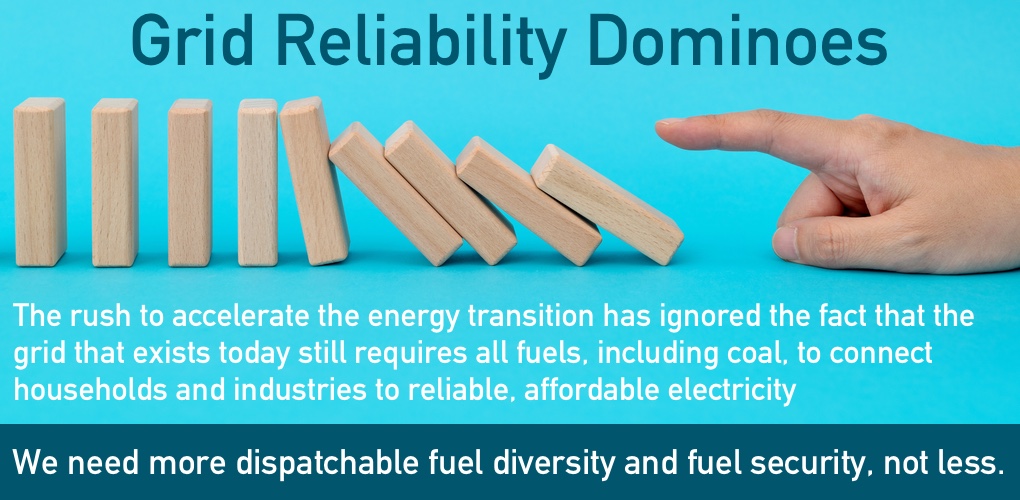
Dropping a Bomb on Electricity Affordability and Reliability
Senator Manchin began a Senate Energy and Natural Resources Committee hearing with the Federal Energy Regulatory Commission (FERC) by warning that, as the nation takes on the climate challenge, “we have to maintain a diverse and reliable energy mix with the technologies necessary to reduce emissions.”
What he soon heard was that the very proposals coming from House Democrats to upend the nation’s electricity grid, namely through the Clean Electricity Performance Program (CEPP), would make energy cost increases and reliability issues “inevitable.” FERC commissioners James Danly and Mark Christie spared no punches. Commissioner Christie pointed to Senator Manchin’s West Virginia and the extreme reliability and affordability concerns that would come from trying to rapidly pivot away from and replace the coal plants that meet 90% of the state’s power.
Commissioner Danly took a broader view but struck an even more dire tone, warning, “The bill as I read it seems to create an incentive and penalty structure that would absolutely change and frustrate every single expectation we have for [markets], effectively dropping an H bomb into the middle of them.” He later added, “Consequences will be profound, disruptive, and incalculable.”
Commissioner Allison Clements, who tried to defend the CEPP after the hearing, told E&E News, “…we can operate a highly variable and flexible and nimble and reliable system, so long as we plan for it.” But her defense gets directly to the heart of the problem: the CEPP is simply an incentive program on steroids without any planning. It pushes a timeline that will make it near impossible to stand up the infrastructure and vast changes to market structures needed to responsibly accommodate so much intermittent power.
Senator Manchin has been outspoken about his deep reservations about the CEPP, and echoed those warnings, saying reliability would be “the big loser” if Congress moves ahead with the bill as proposed. “I guarantee you the utilities will take every dime you want to give them, but they will not commit and basically be held accountable for reliability,” he added.
Europe’s Energy Crisis Casts a Long Shadow
The hearing was timely, not just because of the accelerating timeline for a vote on Reconciliation and the potential inclusion of the CEPP, but because Europe has stumbled into a perfect storm of an energy crisis that is reverberating across the Atlantic. It’s a crisis that is sending energy prices through the roof and raising deep concerns about the ability to keep the lights on and homes warm this winter.
Europe’s energy policies, designed to disassemble the supply of fossil fuels well before addressing their demand, have come home to roost. Europe now finds itself woefully short of natural gas and beholden to sky-high gas prices. After closing the majority of its coal fleet, dispatchable fuel diversity that could alleviate pressure on the gas market is in short supply. Soaring liquified natural gas (LNG) prices in Europe and Asia are now proving disruptive in the U.S.
With U.S. LNG exports now gobbling up 10% of U.S. gas production, and more export capacity set to enter service, U.S. gas prices are feeling the pressure of an overheated global market. Though they aren’t as high as they are in Europe and Asia, U.S. gas prices have jumped 200% in just a year and are the highest they have been since 2008.
In response, U.S. utilities are scrambling for coal to alleviate price pressure on consumers. While the nation’s remaining coal capacity has bailed out regional grids time and again, more than a decade of painfully effective policies to dismantle the coal industry and the coal supply chain have left it with little capacity to ramp up production to meet soaring demand.
Grid Reliability Dominoes
As natural gas prices jump, coal supplies tighten and questions mount over the reliability of the grid this winter, expect to hear those advocating most loudly for the CEPP and an accelerated energy transition to double down. But of course, it’s their policies and agenda that have set up grid reliability dominoes.
Working for more than a decade to dismantle the coal industry and erode the nation’s dispatchable fuel diversity was always going to have consequences. We’ve already seen them in California and Texas, and we are now teetering on the edge of far worse. The coal industry downsized according to the market and policy signals it was given. Operations were slowed or closed altogether, and workforces shrunk. Ramping production back up – reopening mines and recruiting a new workforce to meet a demand that policymakers want to disappear – is challenging and complex.
As a direct result of efforts to shutter the coal industry – and vilify fossil fuels – production is down and will remain down for the foreseeable future. This isn’t a coal crisis. This is a crisis of bad energy policy that has dismantled the dispatchable fuel diversity and the complex supply chains needed to ensure reliability and affordability.
Some will say the supply constrains with coal and natural gas are a reason to accelerate the transition. But accelerate to what? Throwing tens-of-billions of more dollars at intermittent power with no plan to preserve the resources that backstop it is simply negligence.
The rush to accelerate the energy transition has ignored the fact that the grid that exists today still requires all fuels, including coal, to connect households and industries to reliable, affordable electricity. The nation clearly needs more dispatchable fuel diversity and fuel security to navigate the road ahead, not less. Hitting the accelerator on a path that makes energy cost increases and reliability issues inevitable can’t possibly be the right one.
- On September 29, 2021
